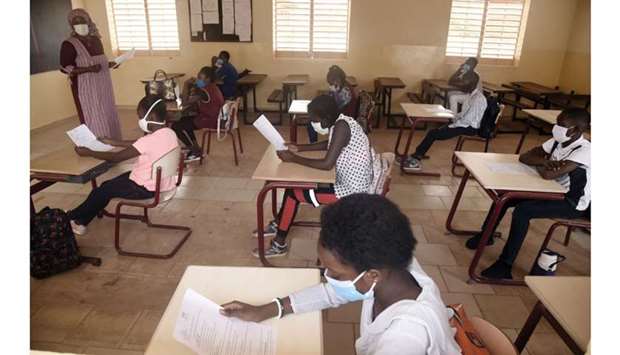Half a million Senegalese schoolchildren returned to class yesterday, under instructions to wear face masks and keep a distance from each other, after three months of absence.
The government in the West Africa state shut schools in mid-March in a bid to curb coronavirus infections.
It initially intended to open them again on June 5, but delayed the decision at the last minute after several teachers were found to have caught the virus.
Yesterday’s reopening affects 551,000 children out of some 3.5mn in Senegal, with only pupils who are sitting exams this year returning to class.
“We have reduced the number of pupils in the classes, some of which have fewer than 20 (people),” said Abdoul Diop, a headmaster in the capital Dakar, where class sizes are often large.
Diop explained that all his students were wearing masks — which the school had made available, alongside hand sanitisers.
Senegal has recorded 6,233 coronavirus cases to date, with 94 fatalities.
The country’s caseload pales in comparison to virus-stricken countries such as the United States.
But as with other poor countries in the region, there are concerns about the government’s ability to handle a large outbreak.
Cases continue to rise, and President Macky Sall went into quarantine on Wednesday after coming into contact with an infected person, according to his office, which added that he had nonetheless tested negative for Covid-19.
Closing schools in March has disrupted Senegal’s normal school year, which usually ends in July.
This year, examinations have been pushed back until late August and early September.
Other anti-virus measures, such as shutting universities, closing the land and air borders, and imposing a night-time curfew, remain in place.
Zambia reopens airports
to boost tourism
Zambia’s President Edgar Lungu yesterday announced the immediate reopening of all three of the landlocked country’s international airports to help revitalise the tourism sector hit hard by the coronavirus pandemic.
Lungu said decreased economic activity since the start of April caused a loss in revenues of 20.8bn kwachas ($1.1bn).
He announced the reopening of the three international airports with “immediate” effect to help boost earnings, adding: “In the tourism sector...we have also got to get back to work.”
Zambia’s tourism industry — with the stunning Victoria Falls as its flagship attraction — contributed $1.8bn to the national economy in 2018, according to data by the World Travel and Tourism Council.
Lungu directed the ministers of communication, finance, home affairs and tourism to work together to devise stringent health guidelines for arriving tourists.
Over the last 24 hours, Zambia recorded eight new coronavirus cases, for a total of 1,497 with 18 deaths.
The number of recoveries now stands at 1,223.
The president urged Zambia’s more than 17mn citizens to observe high standards of hygiene as the winter season peaks in the southern hemisphere, warning that the numbers of coronavirus cases in Zambia could soar.
Nigeria faces extreme
poverty: World Bank
Nigeria’s coronavirus outbreak may push 5mn people into poverty as it triggers the worst recession in the African powerhouse since the 1980s, the World Bank said yesterday.
The twin shock of the pandemic and a global oil price crash has pummelled Nigeria, which has Africa’s largest economy mainly because it is the continent’s top crude producer.
But Nigeria also has the highest number of people living in extreme poverty in the world, and has not recovered from another recession in 2016.
The World Bank forecasts Nigeria’s economy will shrink 3.2-7.4% this year, depending on the severity of the Covid-19 outbreak. In a worst case scenario, the recession could continue into 2021 when the economy could contract 2%, it said.
Poverty and unemployment have often fuelled violent insecurity in Nigeria, from militants in the oil-rich Niger Delta to the Islamist Boko Haram insurgency in the northeast and banditry in the northwest. Thousands have been killed.

Pupils wearing face masks attend a class in Dakar yesterday.
